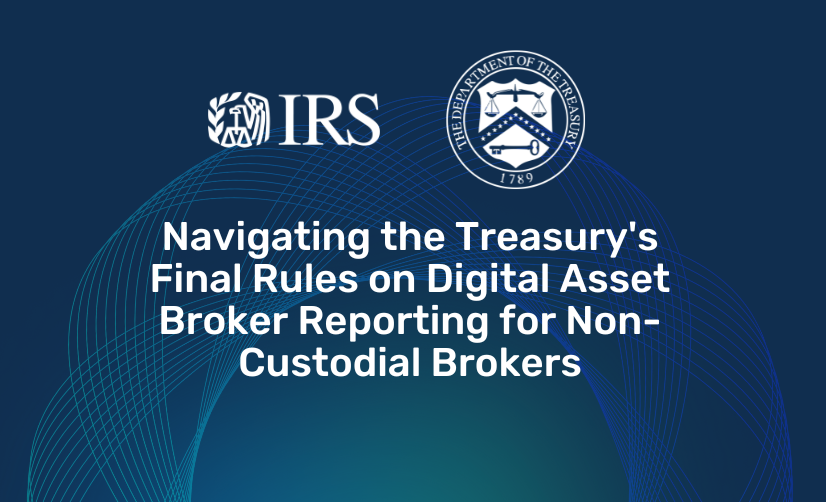The end of 2024 has seen a flurry of activity with Treasury and the IRS. On Friday, December 27, 2024, Treasury and the IRS released additional Section 6045 regulations, focusing on non-custodial brokers, which they deferred on in June of 2024. Additionally, the IRS also released Notice 2025-3, which provides for transitional relief for reporting and backup withholding in connection with non-custodial entities.
Just a few days later, on December 31, 2024, the IRS issued Notice 2025-7, which provides additional temporary relief for custodial exchanges that are not able to adequately meet the deadlines for specific lot identification.
Keeping up to date with all of the many crypto related regulatory changes in 2024 has been challenging. This article, along with our previously released deep dive of the finalized 6045 regulations, will breakdown what you need to know as a digital asset enterprise.
Section 6045 Regulations: Non-Custodial Entities
Who is in Scope:
Under these second final regulations, Treasury generally categorized decentralized finance as having three layers (while acknowledging there is often more nuance): (1) a front-end service provider layer, (2) an application layer, and (3) a settlement layer. These final regulations include only front-end user interface layers in the definition of “broker” under Sec. 6045 of the tax code as tax-reporting entities.
The rules focus on defining the term digital asset middleman, focusing on persons that provide an effectuating service.
An effectuating service is any service that is:
- A trading front-end service and;
- Where the type of arrangement means the provider would know or is in a position to know whether the nature of the transaction involved gives rise to reportable gross proceeds from the sale of digital assets.
A trading front end service means a user interface that enables a user to input order details and transmit those order details to an automated protocol that is part of a distributed ledger network. This seems to focus on persons who operate websites that enable users to connect to digital asset trading protocols
Being in a position to know turns on whether the person has control or sufficient influence–the standard set forth by the OECD in 2021–over the trading front end-service. Treasury defines this as 3 things:
- The ability to amend, update, or otherwise affect the terms under which the services are provided
- The ability to collect fees from the transaction flow, whether or not such fees are being collected
- The ability to track or receive confirmation back from the distributed ledger that the order was executed and posted to the ledger
Back Up Withholding Implications:
The regulations also provide some clarity on the responsibility to withhold on those customers that do not provide a taxpayer identification number. The regulations indicate that Treasury understands more time and guidance is needed with respect to the backup withholding obligations for front-end service providers. Treasury stated that they intend to later publish a notice of proposed rulemaking that would provide trading front-end service providers with flexibility on how such backup withholding should be required.
Who is out of Scope:
The rules expressly carve out two specific groups from the definition of effectuating services–validation services and wallet software providers.
Validation Services
Treasury excludes from the definition of effectuating services all distributed ledger validation services. This includes all services necessary to complete the validation of transactions on a blockchain, regardless of the consensus mechanism involved–proof-of-work, proof-of-stake, or any other mechanism.
Wallet Providers
Treasury also excludes persons that license or sell unhosted wallet services that are used to manage private keys. This exception, however, is not absolute. Where an unhosted wallet service provider also provides effectuating services, including trading front-end services, as defined in the regulations, the wallet service provider will be subject to reporting—but only with respect to the effectuating services component of their business. Treasury includes in the definition of broker unhosted wallets that also provide trading front-end services for a transaction because that “wallet provider creates the coded trade order instructions that includes the specifics of the customer’s trade order … [thus] the person providing these enhanced wallet services has the information about the underlying sale.” Treasury’s rationale for this is that “these persons also interact directly with their customers and, as such, can obtain the customer’s identity. Accordingly, it is appropriate in these cases to treat these enhanced wallet trading front-end services as effectuating services under the final regulation and a person providing these enhanced wallet services as a digital asset middleman.”
While not explicitly carved out from the definition of effectuating services in the regulations, Treasury also indicates that the following are also not considered brokers.
Operators of Digital Asset Trading Protocols
The regulations define a digital asset trading protocol as the decentralized (on-chain) application consisting of automatically executing (smart) contracts that exchange one digital asset for another. The regulations update the list of examples illustrating persons that are not considered brokers. Treasury updated those examples to now include operators of digital asset trading protocols that provide such protocols without offering other services or functions that would constitute effectuating services under the regulations–such as a trading front-end service.
Liquidity and Staking Pool Providers
While not explicitly covered in the regulations, Treasury states that under these final regulations liquidity- and staking-pool providers might fall within the definition of trading front-end services. Treasure notes, however, those types of services will not have to conduct tax reporting anytime soon, as Notice 2024-57 issued this past summer remains in effect granting reporting relief to such activities while Treasury and IRS continue to formulate guidance for such activities. Staking services, however, that do not provide for sales of digital assets do not give rise to those services being tax-reporting brokers.
Effective Dates:
This second set of final regulations applies to front-end service providers beginning with transactions taking place as of January 1, 2027, meaning those services providers would have to first conduct tax reporting in early 2028 for the 2027 tax year.
Treasury delayed by one year the withholding requirement for those services providers whose customers do not provide them with accurate taxpayer-identification numbers, so such withholding would not have to take place until January 1, 2028 at the earliest.
Notice 2025-3
This Notice provides transitional relief from penalties relating to reporting for calendar year 2027 (reported in 2028) for brokers providing trading front-end services, as described in §1.6045-1(a)(21)(iii)(A) (DeFi brokers), provided that the broker makes a good faith effort to file the appropriate information returns.
Additionally, the Notice provides transitional relief from documentation and backup withholding obligations. Specifically, the notice provides relief for documentation and withholding: (1) for any sale of a digital asset effected by a DeFi broker during calendar year 2027; and (2) for any sale of a digital asset effected by a DeFi broker during calendar year 2028 for a customer (payee) if the broker submits that payee’s name and tax identification number (TIN) combination to the Internal Revenue Service’s (IRS) TIN Matching Program and receives a response that the name and TIN combination furnished by the payee matches the name and TIN combination for that payee in IRS records.
For sales effected before January 1, 2029, this notice also provides that a DeFi broker may treat a customer as an exempt foreign person if the customer has not been previously classified as a U.S. person by the DeFi broker, and the information that the DeFi broker has for the customer includes a residence address that is not a U.S. address.
Lastly, the Notice also provides transitional relief from penalties for DeFi brokers who fail to backup withhold and pay the full backup withholding tax due if such failure is due to a decrease in the value of withheld digital assets in a sale of digital assets in return for different digital assets effected on or before December 31, 2028, and the broker immediately liquidates the withheld digital assets for cash.
Notice 2025-7
Finally, this Notice provides some relief for individual taxpayers concerned about the regulatory requirement that they “adequately identify” which digital asset unit (lot) they are selling to their custodial broker for an account held with that broker. Under the final regulations, taxpayers are required as of January 1, 2025, to adequately identify to their custodial broker which unit they are selling in their account. Where a taxpayer fails to make this identification, the units in that account are deemed sold on a first in, first out (FIFO) basis.
Under the same regulations, however, brokers are not required to receive or track this same information until January 1, 2026, causing an issue for taxpayers who attempt to make an adequate identification during 2025 but simply cannot do so because their broker is not yet prepared (or required) to receive that information.
This disconnect raised concerns that taxpayers may be forced to report using FIFO for their custodial account holdings for the 2025 tax year even though they attempted to make adequate identifications with respect to sales in those accounts.
The Notice provides relief on this issue, allowing a taxpayer, for the 2025 tax year only, to make the adequate identification to themselves rather than to their broker. A taxpayer needs to track and keep a record of the adequate identification at or before the time of a sale and has two options:
- Make an identification and keep a record of it for each individual sale throughout the year
- Establish a standing instruction that applies to a custodial account for every sale during the year. The method needs to be applied consistently for the entire year but can follow first in, first out; last in, last out; highest in, highest out; etc.
Although the Notice provides relief with respect to the methods available for making an adequate identification of units sold within a custodial account, it does not impact the more fundamental change imposed by the regulations that as of January 1, 2025, taxpayers will need to track all of their digital asset holdings separately by each individual wallet or account. In June 2024, the IRS issued Rev. Proc. 2024-28 providing safe harbor methods for taxpayers tracking their holdings on a universal or aggregate basis to transition to the per wallet or account method. This Notice indicates that Rev. Proc. 2024-28 needs to still be complied with before a taxpayer can make use of the relief contained in the Notice.
Separately, the Notice also does not impact the timeline for brokers to begin reporting. Custodial brokers will still need to collect customer information during 2025 and report on gross proceeds from customer sales that happened during 2025 in early 2026.
.png)


